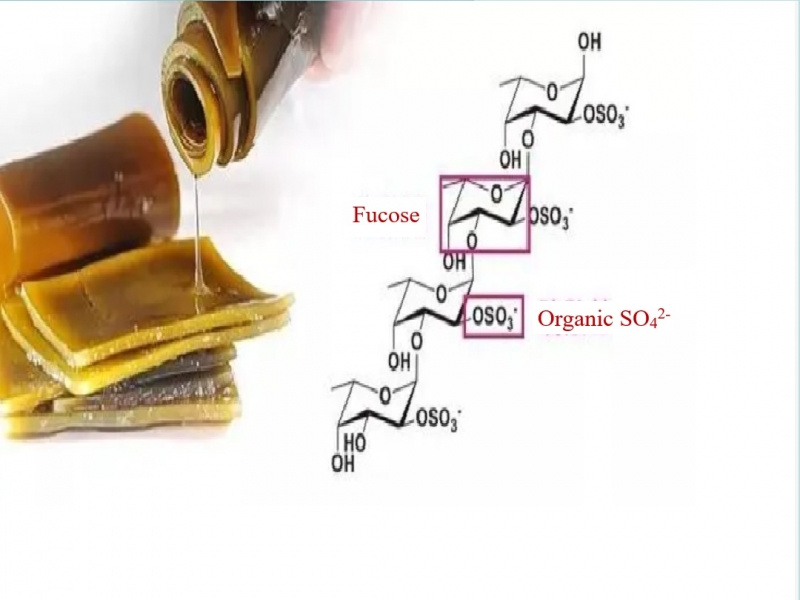
The smaller fucoidan molecular weight, the better?
Fucoidan extract powder is a unique water-soluble sulfated polysaccharide mainly composed of fucose in brown algae, which has good biological activity. However, the chemical composition, structure and biological activity of laminar fucoidan with different molecular weights are quite different, and the digestion and absorption of high molecular weight laminar fucoidan has been questioned. Therefore, it is of great significance to clarify the influence of molecular weight on the digestion, absorption and biological activity of kelp fucoidan for the development of functional products of kelp fucoidan. Based on this background, in this paper, the chemical composition and activity of laminar fucoidan with different molecular weights were systematically studied using laminar fucoidan powder as raw material.
The research content of this paper includes the following parts:
1.Study on the chemical composition of laminar fucoidan (kelp-Fucoidan) with different molecular weight obtained by different preparation methods: fractional purification and free radical oxidative degradation by Q-SephroseFF anion chromatography column Fucoidan with medium and low molecular weight components were prepared by this method, and their chemical indicators such as molecular weight, sulfate content and monosaccharide composition were measured at the same time. The appropriate fractional elution concentrations of medium molecular weight fucoidan were determined, which were 1mol/LNaC1 and 2.5mol/LNaC1 respectively, and F-1 (26kDa) and F-2 (34kDa) components were obtained at these two concentrations , the sulfate content was 13.44% and 29.57% respectively, by comparing the quality of raw sugar and the H2O2 concentration on the molecular weight and chemical composition of the product, the best method for preparing low molecular weight fucoidan with high sulfate and high fucose was determined. Conditions are: 4.5%H2O2 and 0.0267mol/LCu2+ degrade 4.5g fucoidan to obtain Fa3 (Mw7.68kDa) and Fb3 (Mw3.89kDa) two components, the sulfate content is higher, respectively 30.32 % and 32.48%. The Fa3 fraction was mainly composed of fucose (64.25%) and galactose (30.74%), while the content of sulfate and galactose in Fb3 was higher than that of Fa3, but the content of fucose decreased.
2. The establishment of the determination method of serum monosaccharide content: verified that the PMP-HPLC method can accurately determine the composition of serum monosaccharide. The method is sensitive, accurate, has good reproducibility, suffers few interference factors, and can satisfy the qualitative and quantitative detection of fucose content in rat serum. At the same time, it can also quantitatively detect the five monosaccharides contained in serum samples: mannose, galactosamine, glucosamine, glucose and galactose. The recoveries of serum fucose spiked by PMP-HPLC were between 102.7% and 105.3%, and the RSD was 1.31%.
3.The digestion and absorption characteristics of different molecular weight kelp Fucoidan: the digestion and absorption characteristics of different molecular weight kelp Fucoidan in rats were studied by PMP-HPLC method. Kelp Fucoidan with molecular weight can be absorbed by rats after oral administration, but the absorption rate of middle molecular weight is relatively slow, and the change trend of serum fucose is not obvious, while the absorption rate of low molecular weight components after free radical degradation is greatly increased . It can be concluded that the molecular weight can affect the absorption effect of polysaccharides, and the absorption efficiency is roughly inversely proportional to the molecular weight. The lower the molecular weight, the higher the absorption efficiency.
4. Immunomodulatory effect of different molecular weight kelp Fucoidan: by gavage of different molecular weight kelp Fucoidan components to mice, it can be concluded that both medium and low molecular weight kelp fucoidan sulfate components can significantly improve the immune system Ratio of spleen/body mass in mice, increased serum hemolysin content, increased peritoneal macrophage phagocytosis of chicken erythrocytes, and enhanced delayed-type hypersensitivity. Laminaria fucoidan has a good immunoregulatory effect on immunocompromised mice, and there is no significant difference in the immunomodulatory effect of medium and low molecular weight fucoidan on immunocompromised mice.
5. The effect of different molecular weight kelp Fucoidan on inhibiting influenza virus neuraminidase in vitro: through in vitro experiments, it is found that different molecular weight kelp Fucoidan components have a good effect on inhibiting influenza virus neuraminidase activity, but the middle molecular weight The inhibitory activity of the fraction was significantly higher than that of the low molecular weight fraction.
In conclusion, the comparative study of the digestion and absorption characteristics, immunity and anti-influenza virus activity of laminar fucoidan with different molecular weights will not only lay the foundation for in-depth study of the structure-activity relationship between molecular weight, structure and activity, but also lay a foundation for the study of low molecular weight laminar fucoidan, as well as provide a theoretical basis for fucoidan uses in functional food.
Through the research, we can get the conclusion:
1. For the molecular weight of the fucoidan used in the experiment, the low molecular weight is at the thousand Dao (ton) level, and the medium molecular weight is at the ten thousand Dao level. Instead of the 500 Dalton advertised by some fucoidan manufacturers in Taiwan.
2. Experiments have confirmed that the molecular weight can affect the absorption effect of fucoidan, and the absorption efficiency is roughly inversely proportional to the molecular weight. The lower the molecular weight, the higher the absorption efficiency. Note, however, that only absorption has been demonstrated, not efficacy.
3. It is important to pay attention to the conclusion of the efficacy study: kelp fucoidan has a good immunoregulatory effect on immunocompromised mice, and medium and low molecular weight fucoidan has no effect on immunocompromised mice. There was no significant difference in immunomodulatory effects.
4. Laminaria Fucoidan fractions with different molecular weights all had good inhibitory effect on influenza virus neuraminidase activity, but the inhibitory activity of the middle molecular weight fraction was significantly higher than that of the low molecular weight fraction.
The above conclusions do not support the argument that the smaller fucoidan molecular weight is, the better it is.
The point is: do the so-called fucoidan of 500 Daltons still have such a high sulfate content?
